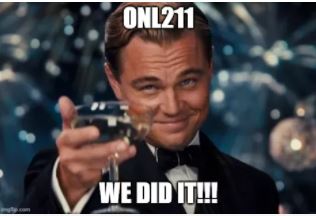Final post
So, we are coming to an end of the whole ONL211 journey, and as with most journeys my feelings are a bit divided: Yes, finally! No, already?!
I am so grateful that I signed up for this course and participated and I feel that my newly acquired knowledge is like a huge chest of gold. But I also feel a bit relieved that it is over, as the experience from time to time has been at bit intense.
 Treasure chest filled with gold, jewelry, and gems.
Treasure chest filled with gold, jewelry, and gems.
Expectations vs. reality
From what I expected in advance, this course has given me all that and so much more. I hoped to learn some more about the theories behind successful online and blended learning, and also how to use some different tools for e- collaboration and – activities. What I also got, besides that, was a much deeper background and understanding of learning theories, and research on open networked learning. I also learned a lot more about the importance of learning communities and networks, and how to create, discover, develop and maintain them. I have attended webinars and listened to podcasts with so many truly inspiring researchers in the field, and also found new sources to read and learn more from in the future. The most important thing? I guess it is the great power of learning communities.
PBL-group work
I think the composition of our PBL group, PBL03 was a really good match of people, and that our facilitator and co-facilitator Kelly and Esther so well contributed to glue us together right from the start. We are different people in so many ways, but we also share a lot of common ground. Another thing that we did well on is that we always stuck to what we decided in our common learning agreement document. Actually, I think we shined at this!
- we try to keep to time
- have a sense of humour

- Look out for each other (I tend to forget to do this)
- if not able to attend, notify the others
- Have a positive and supportive attitude

- share previous experience- good and bad examples
- actively contribute and participate
- be curious
- we are open to try out new tools for our group presentations (each topic/team uses a new tool)
- we communicate in den ONL211 community space and use that space to stay connected
- if we are late or we cannot attend the meeting we will note that in the meeting agenda google document
 Meme created by my group member Janne.
Meme created by my group member Janne.
My greatest challenge
The greatest challenge for me was time management. To combine my daily work and family life with this huge field of exploration that suddenly opened up in front of me. In the beginning I felt a bit overwhelmed by all the information; sources to read, group meetings to attend, scenarios to interpret, shared documents to add findings in, webinars to attend, blogs to read and so it went on. It sometimes felt like being thrown into cold water, and luckily my team members were there to swim with me. After a few weeks, it felt easier to float along, but to set time limits for myself were absolutely necessary for me.
What I bring with me and how this will influence my practice.
In many ways. I will definitely bring my enhanced knowledge about the power of learning communities and networks, and even more than before encourage my students to explore together. I will also bring the importance of the students to be able to interact with the course content itself, not only me as an instruction or other students. Surely, I will bring the above described thrown-into-the -water felling with me into my own practice, and really ensure that my students are 1. Given explicit instructions in the beginning and 2. Being able to share their start-up experience with each other. (In online training that can be as simple as, if possible, adding a discussion thread called “Your thoughts so far” in the learning management system used. Or create a Zoom-meeting café). I will bring with me all the inspiration of the use of different tools that me and my PBL-group have explored together. Padlet, Miro, ThingLink, Learning ToolBox, SimpleShow, PowToon, Pictochart. But also, just all the things you could do in an plain Zoom-meeting, like chat bombing, polls, screen sharing with annotation, and liberating structures like 1-2-4-all and Talking object. My favourite tool of choice? Definitely ThingLink. Try it if you haven’t yet.
I will also bring with me, for my own sake, where to further explore and learn more about this fascinating field. And last but definitely not least: all my new international contacts.
Thank you ONL-team, all ONL211 participants, and especially PBL03:ers. It has been a lovely journey!

Best, Christina